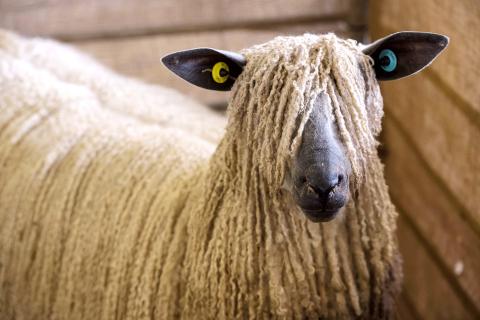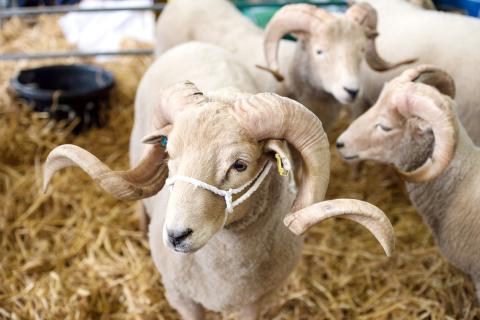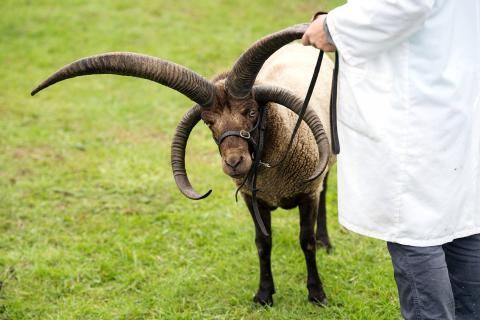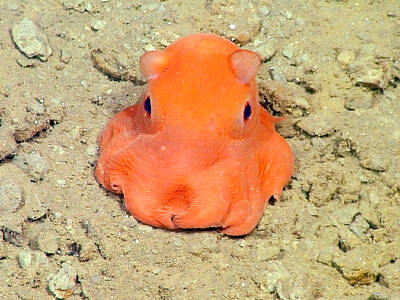Wensleydale
The Wensleydale is a breed of domestic sheep that takes its names from the Wensleydale region of North Yorkshire, England, where it originated. With its distinctive grey black face and slightly elongated, upright ears, the Wensleydale was developed by crossing two other breeds, the English Leicester and the Teeswater sheep, in the 19th century. It is one of the largest and heaviest of sheep breeds, and produces some of the finest long wool in the world. Rams weigh about 135 kgs and ewes about 115 kgs.
文斯勒德羊

Photo: AFP
照片:法新社
文斯勒德羊是一種家羊的品種,因其源自英國北約克郡的文斯勒德地區而得名。文斯勒德羊是十九世紀時由另外兩個品種萊斯特羊和蒂斯沃特羊混種而成,而有獨特的灰黑色臉及較細長的、豎立的耳朵。這是最大型、最重的羊品種之一,可產出品質頂尖的長羊毛。公羊重約一百三十五公斤,母羊約一百一十五公斤。
Portland
Unlike the Wensleydale, the Portland is a small sheep. It has a cream-colored fleece and golden tan face and legs. The males have a distinct double spiral set of horns and, while the females are also horned, their horns are lighter and shorter, forming a crescent shape. Another distinctive feature is the “spectacles” formed of pale patches around the eyes.

Photo: AFP
照片:法新社
The Portland is now listed as “at risk.” It almost became extinct in the 1970s, despite once being quite a common breed in the southwest of England.
波特蘭羊
不同於文斯勒德羊,波特蘭羊是較小的品種,有著奶油色的羊毛以及金棕色的臉和腳。公羊有兩對特殊的螺旋形的角,而母羊也有角,但更輕更短,呈新月形。波特蘭羊另一特色是其眼睛周圍有淡色斑點形成的「眼鏡」。

Photo: AFP
照片:法新社
波特蘭羊現已被列為「瀕臨絕種」的品種。雖然它曾是英格蘭西南部相當普遍的品種,但它在七○年代幾乎已經滅絕了。
Manx Loaghtan
The Manx Loaghtan is a rare breed of small sheep with dark brown wool that does not cover its dark brown faces and legs. It generally has four horns, usually small on the ewes but larger on the males, although individuals are also found with two or six horns.
One of the Northern European short-tailed sheep breeds, the Manx Loaghtan descends from the primitive sheep once found throughout Scotland, the Hebrides, and Shetland Islands.
The breed is mainly reared for its meat, which is considered to be a delicacy.
(Paul Cooper, Taipei Times)
曼島綿羊
曼島綿羊是一種稀有品種的小型羊,除了深棕色的臉和腳以外,全身都佈滿深棕色羊毛。這種羊通常有四支角,母羊的角通常較小,而公羊的角較大,偶爾也可見有兩支或六支角的曼島綿羊。
曼島綿羊屬北歐短尾羊品種的一支,是遍及蘇格蘭、赫布里底群島及昔德蘭群島的原始品種的後代。
曼島綿羊主要是作為肉類食用,咸認為一佳餚。
(台北時報編譯林俐凱譯)

Bilingual Story is a fictionalized account. 雙語故事部分內容純屬虛構。 I stand by the Miluo River as dusk falls. The court betrayal is too much. I served Chu with loyalty. I forged alliances and fought corruption. But the whispers of jealous courtiers, the murmurs of treason, spoke louder. The king cast me out. The water looks calm. It promises peace. I step in. The river is cold against my legs. I hear shouts behind me — fishermen calling my name. I keep walking. The calls grow louder, but I do not turn around. The water rises to my chest. It pulls at me. I

In Taiwan, people can use a platform to rent a power washer for a weekend or share unused garage space for someone’s storage needs. These are examples of the sharing economy, a consumption model that has gained widespread adoption worldwide. This approach allows people to rent or share assets like cars, homes or even services, typically through online platforms. This innovative model poses a simple yet powerful question: why purchase infrequently used items when sharing is more practical? By making useful but idle resources accessible, the sharing economy turns them into sustainable opportunities. Internationally, platforms like Airbnb and Uber have popularized

Continued from yesterday(延續自昨日) https://www.taipeitimes.com/News/lang Many people may be familiar with flapjack octopuses thanks to Pearl, a charming character from the Pixar film Finding Nemo. However, her portrayal presents several scientific inaccuracies. In reality, flapjack octopuses are deep-sea creatures, which are unsuitable for the brightly lit shallow reef environment depicted in the film. Their primary defense mechanism relies on their reddish coloration, which would be ineffective in the well-lit shallows. Pearl’s famous line, “You guys made me ink,” is another fictional detail that is not consistent with the observed actions of real flapjack octopuses. As common as it is in many other octopus

A: Recently, I’ve been seeing mosquitoes flying around in front of my eyes. The doctor said it’s the “flying-mosquito disease.” B: Flying mosquitoes? What a strange name. A: They’re actually called “floaters” in English, meaning floating debris. When fibrous substances in the vitreous body inside the eyeballs increase, floaters can appear in the visual field. B: Oh my goodness. Can you get rid of them? A: According to ophthalmologist Horng Chi-ting’s research, taking the enzymes of certain fruits is likely to help reduce floaters. A: 我最近一直覺得眼前有蚊子飛來飛去,結果醫生說是「飛蚊症」。 B: 飛蚊症?好奇怪的病名。 A: 英文名稱叫「floaters」, 也就是漂浮物的意思。 因為眼球的玻璃體中纖維化物質增多,導致視野出現漂浮物。 B: 天啊!要怎麼把蚊子趕走? A: